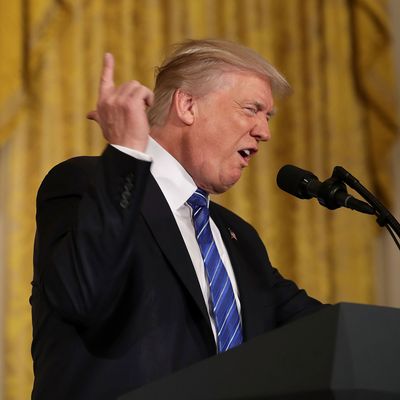
“Donald Trump — think about how he talks,” a senior White House official told me recently. This person then mimicked the president’s manner of speaking: “How do you think Mike Pence is doing as vice-president? Is Mike Pence doing a good job? Let me ask you this: Did I make the right call on Pence?”
The official continued: “Okay, this is the vice-president of the United States. Think about what he did to Nikki Haley at that lunch: ‘You guys like Haley? Should I keep her? Tell me if she’s doing a good job, or I’ll get rid of her.’ He asks everyday. It takes a while to understand how he talks.”
This was an attempt to explain why, despite so much media speculation that there will be a wide-scale shakeup among the president’s inner circle, it hasn’t yet come to pass. The question of Donald Trump’s psychology when it comes to firing federal employees is of acute interest right now to anyone concerned by recent reports that he is, or was, seriously considering an action that would likely spark a Constitutional crisis — dispatching Robert Mueller, the special counsel investigating potential collusion between the Trump campaign and Russia.
By appearances, Mueller’s tenure and whatever is left of the country’s sense of political normalcy depend entirely on whether the president, lately in a dark and unsettled mood, succumbs to the impulse to make a perceived antagonist go away, no matter the larger cost. That’s how it seems, anyway. But close observers of Trump’s thinking have discerned some method to his apparent madness: He likes to hear a lot of advice, he likes to think out loud, he likes to prevaricate, and contrary to his image, he does not, in fact, like to fire someone unless forced to by somebody else.
One source close to the president who has been a part of his decision-making process put it this way: “He plays his cards close to the vest. Let’s say you’re trying to give him advice and you’re trying to get him to do something: you’ll make your case to him, and he doesn’t agree with you or he doesn’t disagree with you. He just says, ‘Uh huh, uh huh, alright, uh huh, okay.’ Sometimes you’re not sure whether he absorbed it or not. But you don’t really know what he’s gonna decide until he pops it out.”
The senior White House official remarked that it wasn’t uncommon for the president to speculate about the state of a given person’s employment even while that individual was within earshot. “He asks it in front of me, with people there! Literally, we will be sitting there having dinner, and he’ll just say, ‘How’s he doing? Is he getting killed?’ The first couple of times, you’re like, ‘What the fuck?’ But you get used to it. That’s just how he talks. And he’s done this forever, and that’s the thing.”
This phenomenon, the official said, often results in people around the president hearing snippets of his internal monologue and taking it as gospel. Trump is prone to thinking out loud even when those thoughts suggest plans that are potentially damaging to the credibility of his office and by extension the country. And he likes to hear from a wide variety of advisers and random passersby before he makes a decision. Recall, for instance, the time he polled Mar-a-Lago guests about who he should pick as secretary of State.
Observing Trump in the midst of a prolonged debate is like “watching arguments in court” and then being surprised by the verdict, the senior official said. When an insider draws an impression of where things stand based on a glimpse of the deliberation, that can lead to a narrative bleeding into the press.
The official cited the example of the Paris accord discussions as a parallel to the question of staff firings. “People kept saying this during Paris,” the official said. When someone would attempt to influence Trump’s thinking, “He’d listen, and he’d ask a lot of questions. If you walked out of the room at the time, you might think, ‘Wow, it got through to him!’ But until the decision comes down, it’s not final.”
The speculation about Trump firing Mueller began when Christopher Ruddy, the head of Newsmax Media and personal friend of Trump’s, suggested it was on the president’s mind a few hours after he’d visited the White House earlier this month. The White House officially denied the claim and denied that Ruddy had even discussed the matter with Trump. But around the same time two other associates, Roger Stone and Newt Gingrich, publicly emerged with their own doubts about Mueller — with Stone outright calling on Trump to dismiss him and Gingrich going on Sean Hannity’s Fox News show to label him, “the tip of the deep-state spear.” The president retweeted a promotion for that episode of Hannity, a sign that, coupled with his own agitated tweets about the investigation being a “witch hunt,” the rumors might be true — that is, if we are to take the president thinking aloud seriously.
As of press time, Mueller still has a job. Then again, so do Reince Priebus, Steve Bannon, Sean Spicer, Kellyanne Conway, Jeff Sessions, and a half dozen other staffers and appointees whom Trump was reportedly on the verge of firing at various points in his short White House tenure.
Certainly he’s shown a willingness to oust administration officials who directly threaten his presidency (e.g., Michael Flynn) or whom he views as antagonistic (Sally Yates and James Comey). But this key fact remains: Setting aside Flynn as a special case, not a single member of the president’s inner circle has been removed — despite the fact that the White House is in chaos and his approval ratings are on par with Richard Nixon’s in July of 1973, when he was refusing to turn over tapes to the committee investigating Watergate.
Although Trump once tried and failed to trademark the words, “You’re fired!” — his catchphrase from The Apprentice — it seems that he doesn’t actually enjoy repealing and replacing the loyalists that surround him. Like so much with the president, it’s shtick designed to make him look tough. “At the end of the day, he’s a natural-born salesman and he likes people to like him,” a second senior administration official said. “He’s a conflict-avoider. He hates firing people. He knows he’s gotta fire every one of them — but he can’t bring himself to do it. He’s a Gemini. Do you know what a Gemini is? Those are two people in one body. There’s always two faces with Trump.”
When he does fire someone in his personal orbit, it comes with reluctance and many stages of deliberation. History would also suggest that it requires someone else close to him forcing the action. During the campaign, for instance, where there was high turnover, this was consistently the case: Sam Nunberg was pushed out by Corey Lewandowski who was pushed out by Paul Manafort who was pushed out by Jared Kushner.
Nunberg was the first casualty of the campaign. By July 2015, he’d been fired twice by Trump. And the inner circle had recently expanded to include newcomers, making things feel like The Apprentice was being filmed on Nazino Island. While Trump was visiting Scotland, Nunberg’s Facebook posts from 2007, in which he’d used a racist term to describe Al Sharpton’s daughter, were published by Business Insider. Nunberg immediately suspected the story had been planted by Lewandowski, the increasingly influential campaign manager with whom he’d clashed, and the two began fighting. Nunberg told him, “By the time I’m done with you, your family will be eating out of the garbage” (he rejects the characterization of this statement as a threat).
Both men then repeatedly called Trump to shit-talk each other, but Trump was uninterested: He just wanted to play golf. Over the following 24 hours, surrounded by his children and other Trump Organization employees and calling campaign staff back home, he decided who to believe and what to do. When he finally called Nunberg to give him the news early Sunday afternoon, he was apologetic — promising to write him a recommendation for a new job and to handle his exit quietly (though Lewandowski would ensure that wasn’t the case, ultimately — immediately alerting Bloomberg, the New York Times, and Business Insider).
Looking back on his own experience, Nunberg said, “A lot of people always say, ‘Well, Trump fired so many people during his campaign.’ But those were weird circumstances. You had somebody like me, who — I’d worked for him for four and a half years. I was blown out by somebody who was brought in. And people wanted revenge, and people were gonna return the favor.”
Of course, a campaign is more fluid than a presidential administration. It’s easier to replace staff, and less destructive to do so. Still, paranoia pulses through the West Wing. Each day, it seems, new stories emerge — pushed by officials or sources close to the president — about how things are about to fundamentally change. But is that speculation a reflection of the president’s thinking, or an attempt to influence his thinking by expressing their opinion in the press, where he’s likely to see it? The answer is probably C. All of the above.
The chaos of the questions themselves have become a permanent feature of Trump’s Washington. Thus reporting on potential firings continues to be exponentially more common than actual firings. And in fairness, the president is unpredictable and difficult to read. Everyone close to him might say one thing on Monday, another on Tuesday, and by Friday it’s back to Monday’s story and then on Sunday it’s changed again. During an interview with Slate, Maggie Haberman of the New York Times explained it this way: “He talks on tape the same way that he talks off the record, which is in this really discursive style.” She added, “The key is figuring out when he’s actually thinking about making a change or not, and very rarely are you gonna know until after it’s done.”
So while Trump might seem like an open book, the pages of that book are contradictory, and to assume you know what Trump will do before he does it is to fail to grasp this. The senior White House official admitted that usually with Trump, “the answer is maybe.” Oftentimes, “there are days when he’s upset about something. There are stories that he’s upset about.” This can affect how he discusses his staff or what he intends to do. When things go wrong, as they often have, staffers are an outlet for his rage, and so he might lash out, calling someone a fuck-up and asking others if he should get rid of them. That tends to quickly pass.
But here’s the twist: With Trump feeling as though he’s under siege from all sides, even the people he perceives to be fucking things up are earning points for fucking them up in an attempt to help him. “He looks at Spicer and he sees, like, the coroner from the Wizard of Oz. Remember when the fucking witch got hit in the head with the house?” the senior administration official said. “So, he feels bad for the guy and he knows the guy’s trying really hard. He has a soft spot for the guy. His friends call him up and tell him he’s a loser, and he’s like, ‘Oh, I feel bad for the guy.’”






























